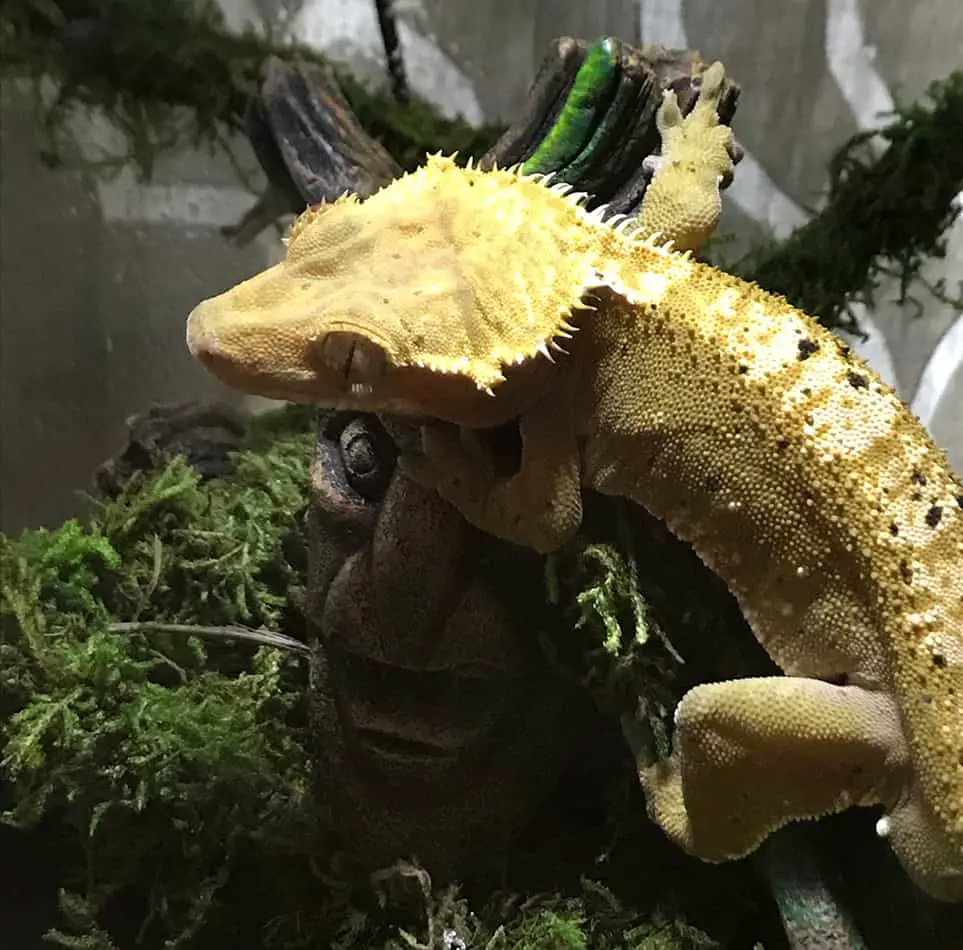Many pet geckos die or get re-homed because of less information and under-preparedness from their previous owners. To avoid encountering the same fate, you may be asking what do I need to know about adopting a gecko? Here are some things to keep top of mind before moving forward to adopt a gecko.

Before adopting a gecko, you should do research about the gecko, be ready for a long-term commitment, the costs for its food and other needs, and put your existing pets into consideration to ensure a healthy and safe environment for your gecko.
If you want to adopt a gecko, this might be a helpful read.
Do Your Research
Don’t adopt a gecko just because you find them cute. Admittedly they are cute, so it is a valid reason! Gecko adoption requires research and critical thinking. Consider looking up the following factors to help you prepare to adopt one.
Lifespan
Research the lifespan of the gecko you want to adopt. It comes first. Why? Geckos belong to the exotic pets category and as such tend to have a long lifespan. The average life of a gecko ranges from 10 to 20 years. Are you ready for that kind of commitment? As the prospective owner, you need to look at if you can invest that much time in providing your pet with its needs.
Behavior
Before you have a pet gecko, find out what their behavior will be like. Maybe you won’t find it that interesting or enjoyable. For example, leopard geckos hide all day. They hide during the day because they are nocturnal creatures. As an owner, you must be aware of this behavior so that you won’t end up disturbing them and causing a lack of sleep for them. You can interact with them and enjoy them, but you also have to be mindful of their needs for just being left alone at times.
Diet
Many Geckos eat live food. This food includes crickets, mealworms, and roaches. Other geckos, like the Crested Gecko, eat special superfood mixes or process fruit products (like Repashy or NatureZone Bites). The bottom line is that, as an exotic animal, a gecko needs specific, specialized food available from a pet store or online purchase. Unlike cat foods and dog foods, grocery stores don’t offer gecko food. You need to intentionally run an errand to a pet store to get its food or buy it online. You’ll need to develop this routine and fit it into your life.
Environment
A pet gecko requires specific conditions in its environment such as proper lighting, humidity and heat. For example, leopard geckos need a terrarium temperature that stays between 73 degrees to 75 degrees Fahrenheit and a specific spot in the terrarium between 85 degrees to 90 degrees Fahrenheit. This temperature requirement plays a crucial role in regulating the gecko’s body heat to aid physiological body functions like digestion and reproduction. The gecko may also need a heating mat as it is much safer than heating rocks.
And then at the other end of the spectrum, if you adopt a Crested Gecko you’ll need to provide a very humid tropical environment that requires you to constantly be misting the terrarium and monitor the humidity to be between 50 & 70º.
Handling
Most geckos don’t like you handling them. It takes time before they trust you. Never pick up a gecko by the tail. Your pet will think you’re a threat and will cast off its tail as a defense mechanism. Once the tail drops off, it can still grow another one but shorter*. A gecko’s tail plays a crucial role as it stores fat during times of food scarcity.
Maybe you are thinking “of course I would not grab the gecko by the tail!” Okay good! But here’s some more considerations. I recently rehomed and adopted a Crested Gecko myself! I found something out the hard way. After I picked up my new gecko and found a nice place in the home for it, I naturally was pretty excited and after just an hour or so reached in to pet him on the head. He was very scared and immediately dropped his tail!
What I learned later is that when purchasing or adopting a new pet gecko it is important to leave them alone for a week or so to let them adjust to their new home.
I realized that just the moving of the terrarium and driving with it in the car were all stressors on my new Crested Gecko! He as actually very stressed still even though I couldn’t tell.
He dropped his tail and started running around to try to escape me. This was a fully grown adult Crested Gecko, so it was a little disappointing to see him drop his beautiful tail! Oh well! Live and learn. Hopefully you won’t have the same experience as I did.
Permit/License
If you worry about permits in owning a gecko, most states in the US don’t require it except Hawaii. This prohibition protects their existing diverse native wildlife in the state.
Geckos Require Long Term Commitment
Previously, I mentioned that a gecko has an average lifespan of 10 to 20 years, depending on species. This length of time means a gecko requires a long-term commitment of care.
Before you decide to adopt one, are you ready for the following tasks that could last a long time as the new owner?
- Providing your gecko fresh and live food from a pet store
- Scheduling an annual vet visit
- Maintaining the cleanliness of your gecko’s tank
- Buying and changing equipment that will keep your gecko healthy and happy
Cost and Maintenance of Owning a Gecko
Unlike dogs and cats, a gecko is an exotic pet that requires special needs.
Special needs include an environment with proper lighting, heating, humidity and food. This means you will need specialized types of equipment and a special kind of meal that will cost.
In this section, I’ll give you a budget estimation from setting up their terrarium to their daily needs.
Terrarium
A gecko’s terrarium will cost between $130 to $1000, depending on size. The recommended terrarium size for an adult gecko is about 16″ high (40 cm), 12″ deep (30 cm), and 24″ wide (60 cm). This costs between $130 and $150. If you are considering a Crested Gecko or a Day Gecko, think it terms of setting up a more vertical terrarium that allows your pet to crawl and climb upward.
Equipment
A gecko’s terrarium needs equipment that imitates their habitat in the wild. You will need specialized types of equipment like:
- UV Lighting – average price ranges between $6 and $56 per piece (you may need more)
- Heating pad – average cost ranges from $9 to $33
- Substrate – average price ranges between $10 and $29
- Furniture – average cost ranges from $10 to $63
- Humidity meter – average price ranges between $5 and $23
You can get terrarium equipment for $75 at the lowest, and the higher end will be around $200.
Investing in these types of equipment will keep them healthy and maximize their lifespan. Preferably, choose quality equipment that will last a long time and proven effective to ensure your gecko doesn’t develop illness.
Food
Buying live foods such as roaches and crickets cost from $15 to $25 each month.
Pet stores sell one box of 50 live crickets for $3 to $5. An adult leopard gecko can eat six to seven large crickets three times a week.
Vet visit
Pet geckos such as leopard geckos cost $50 on the lower end for a vet checkup. It can cost you more depending on the need such as a fecal exam that costs between $30 to $50. Experts recommend an annual vet visit to ensure your gecko lives a healthy life.
Consider Your Other Pets
Cats and dogs kill geckos. For example, a cat’s nature involves hunting smaller animals that include lizards at home. The same case goes with dogs. Their bite will kill the gecko, so make sure you keep your gecko out of their way.
However, geckos can be dangerous to your other pets too.
If you have an existing pet at home such as cats, geckos carry a parasite known as flukes that can cause a tumor to the liver or pancreas of your cats once ingested.
On the other hand, a gecko’s bite may cause a high risk of infection and can make your dogs sick. Some dogs get allergies upon biting or ingesting a gecko. You will need to take your fur babies to a vet for proper medication.
Conclusion
To wrap it up, adopting a gecko requires proper research and understanding of the responsibilities. You need to know the gecko’s lifespan, behavior, diet, environment and handling. This knowledge will help you prepare well as the new owner.
You also need to understand that a gecko needs your long-term commitment. A gecko has a long lifespan, and you will need to invest your time and effort in taking care of your pet for an extended period of time.
Make sure you are financially ready when you get a gecko. Your pet needs a special kind of environment and food to live long and healthy.
Lastly, if you have current pets at home such as cats and dogs, you need to consider them. As much as they can kill your pet gecko, your gecko can also harm them!
